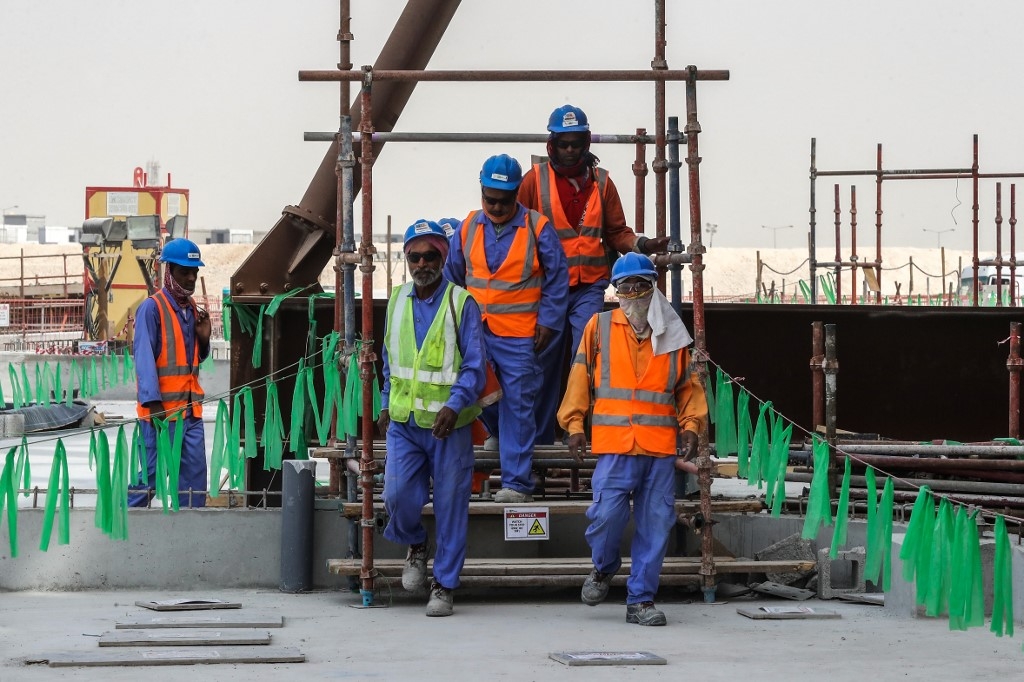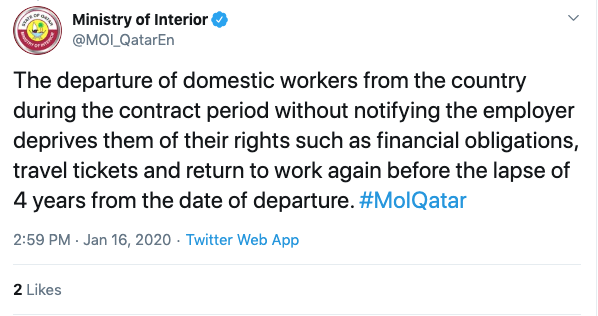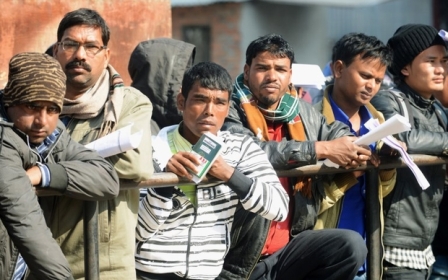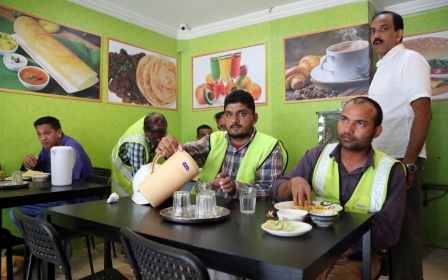Confusion mounts over Qatar's new exit permit regime

Qatar's announcement that it was ending exit permits for foreign workers has raised doubts among analysts after its interior ministry said it will financially penalise domestic workers who fail to notify their employers that they will leave the country.
Late on Thursday, Qatar's interior ministry announced on social media that it would financially "deprive" foreign domestic workers who fail to notify their employers of their intent to leave the country 72 hours in advance.
The penalties listed for foreign domestic workers by Qatar's interior ministry include a four-year ban on re-entering Qatar and a deprivation of wages.
"The departure of domestic workers from the country during the contract period without notifying them deprives them of their rights such as financial obligations, travel tickets, and return to work again before the lapse of four years from departure," the ministry wrote.
New MEE newsletter: Jerusalem Dispatch
Sign up to get the latest insights and analysis on Israel-Palestine, alongside Turkey Unpacked and other MEE newsletters
The tweet, however, was deleted hours after it was issued without any explanation by the Qatari Ministry of Interior.
Houtan Homayounpour, a spokesperson for the International Labour Organisation (ILO), told Middle East Eye that while domestic workers have to inform their employers they plan to leave, they do not have to seek their permission for an exit permit.
"Under the new law, domestic workers do not need any approval to leave the country, they simply need to inform their employer verbally or in writing, as part of their contractual obligations," said Homayounpour.
But the deleted interior ministry tweet has made analysts question the application of Qatar's new exit permit rules and whether domestic workers will benefit from the change.
"The rule changes are indeed very confusing, as the text of the law does mention a form of permission but it is not clear what it will look like and why it is still needed for domestic workers," said May Ramanos from Amnesty International.
"But equally, the Ministry of Interior's mention of punitive measures imposed on workers who fail to seek permission from their employers are worrying and appear to defeat the purpose of the exit permit."
Ramanos's concerns were echoed by Nicholas McGeehan, an independent analyst focusing on Gulf migrant rights, who said that the confusion has created concerns over the implementation of this latest change.
He noted how Qatar had a track record of promising to reform its labour rules, only to often fail to implement changes.
"There seems to be a disconnect between what the law states and what senior officials are saying. We have senior officials stating there will be punitive measures and the interior ministry saying that people who did not ask permission will face punitive sanctions," said McGeehan.
"It is not clear how this 72-hour rule will work in practice and it is obviously open to abuse. This does not seem like the abolition of exit controls, and it seems to signal a desire to retain excessive control over domestic workers and that's one of the most troubling aspects of this."
A Qatar government spokesperson said that the 72-hour rule was put in place to protect the rights of employers and domestic workers and ensure that both parties receive their financial benefits.
“With immediate effect, the measures announced today remove exit permits for all expatriates who are not currently subject to Qatar’s labour law - including domestic workers," the spokesperson told MEE.
Doha has faced global pressure to improve its labour rights after it was appointed host of the 2022 World Cup. Last year, the Qatari government planned to implement significant reforms that would allow migrant workers to change jobs and leave the country without their employer's permission.
Amnesty International in 2019 said that thousands of workers from three companies involved in cleaning and construction had not been paid for several months after their companies went bankrupt following the cancellation of contracts with the gas-rich kingdom.
This article is available in French on Middle East Eye French edition.
Middle East Eye delivers independent and unrivalled coverage and analysis of the Middle East, North Africa and beyond. To learn more about republishing this content and the associated fees, please fill out this form. More about MEE can be found here.





